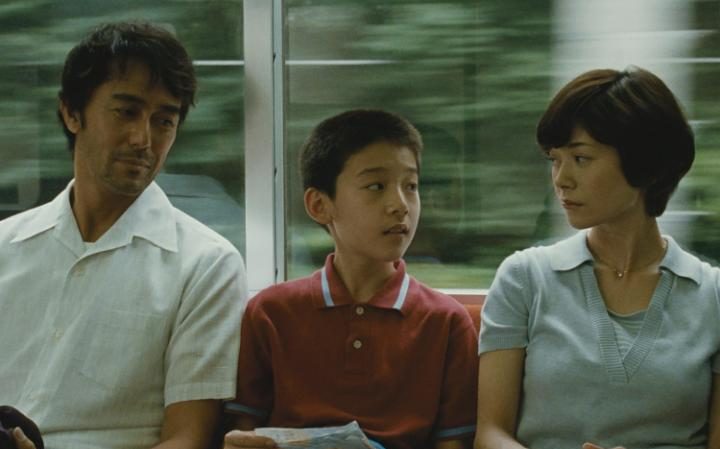
 Japanese broken family drama specialist, Hirokazu Koreeda
(Nobody Knows, Like Father Like Son), returns with
another delicate gem, After the Storm, which continues his string of
modest but telling stories that revolve around how families mold us,
but also how our own selfish instincts sometimes fail us.
Easy-going, slightly offbeat, and willing to engage in the comical side of his
characters, while still remaining heartfelt in approach, his film is a subtle but rewarding look at three
generations of males in the family, specifically in how fathers manage
to fail to live up to expectations, mostly because they seem unable to
accept and enjoy their existence in the present. It's a film
that runs more on character study more so than a ready-made plot, but
with such fine detail that it says so much more to us than a more
conventional approach might.
Japanese broken family drama specialist, Hirokazu Koreeda
(Nobody Knows, Like Father Like Son), returns with
another delicate gem, After the Storm, which continues his string of
modest but telling stories that revolve around how families mold us,
but also how our own selfish instincts sometimes fail us.
Easy-going, slightly offbeat, and willing to engage in the comical side of his
characters, while still remaining heartfelt in approach, his film is a subtle but rewarding look at three
generations of males in the family, specifically in how fathers manage
to fail to live up to expectations, mostly because they seem unable to
accept and enjoy their existence in the present. It's a film
that runs more on character study more so than a ready-made plot, but
with such fine detail that it says so much more to us than a more
conventional approach might.
Hiroshi Abe (Chocolate, Survive Style 5+) plays Ryota, a struggling author turned two-bit detective
(more like blackmailer) who has seemingly squandered his early success
through bad decisions like an addiction to gambling and inability to
be responsible for himself and his commitments to others. It's
what cost him his marriage to Kyoko (Maki, Infection), and what might cost him his
ability to continue to visit his son Shingo (Yoshizawa) on a regular basis in the
future. It's something that doesn't sit quite well with Ryota,
as he fears becoming as remote to Shingo as he had been to his own
recently deceased father during his childhood. When a typhoon
strikes, Ryota finds himself forced for a rare prolonged stay at his
grandmother's (Kiki, Returner) apartment, and a long-in-coming conversation with Kyoko,
with whom he still is very much in love, and the hope that they might
be able to resolve their differences to become a family again.
The storm of its title, of course, is a metaphor for the destructive
force that has caused quite a bit of damage and debris to prevent the
lives of this family from getting back on track. However, the
film, at least in its English title (the Japanese title translates to
"Still deeper than the sea", which is a lyric from a song contained
within the film), is called After the Storm, which is a
different connotation. Storms can destroy, but can also cleanse
and purify, leaving a clean slate from which to draw upon fresh ideas.
It's a time when one must pick up those pieces of debris and begin to
rebuild. It's also a time, when the moisture in the ground
combines with the sunlight as the clouds dissipate, when new life
emerges. There's a hope here for all involved that the new life
will produce better days.
There is a tenderness Koreeda brings to his characters, as well as a
certain amount of love, that makes After the Storm, which
many have claimed to be a spiritual successor to his 2008 gem,
Still Walking, a delight
to delve into and examine. Very few features so elegantly capture
the maturation process from beginning to end, showing how influences
mold us, how our own behavior sometimes betrays us, and what that
causes to our perspective on life once we achieve an age in which we
have to settle into the bed we've made for ourselves and our families.
This is especially true in times of loss, as those left behind pick up
the fragmented pieces, while also trying to find ways to
cope with filling the voids necessary of those people no longer
present.
In addition to the specific relationships, After the Storm
also looks at how class comes into play in terms of feelings of
contentment. Ryota is barely scraping by, but stuck in such a
rut of immaturity and clinging to his past, he's having a tough go
emerging out of it. Rather than work on himself, he extorts
money from adulterers he cases on the job in order to score a few
extra bucks, which he immediately uses to gamble on such things as
horse races and the lottery, hoping to turn his meager earnings into a
tiny fortune. He's chagrined to learn his mother has tossed out
most of dear old dad's things, as he would like to hock the
merchandise, and finds that his father was also doing the same toward
the end of his life. Meanwhile, mother has had a lifetime of
feeling like they've never progressed, buying their apartment in their
youth as a stepping stone to perhaps getting their own home, then
remaining their entire lives living in the projects where seemingly
young and hopeful people never escape.
Koreeda specifically looks at male weaknesses in relationships.
Women are able to move on, sometimes immediately, such as in the
grandmother's case, who tossed out her husband's things shortly after
his passing, or in Kyoko, who has managed to seek another potential
mate, despite Ryota still lingering as if waiting for her to
reconsider. Koreeda compares this to an oil painting, where the
new man is painted over the old, which is still present in the memory
but has no place still existing in sight. Ryota loves her, but
she has more needs in a relationship, explaining to him that,
“Grown ups can’t live on love alone," which both admonishes Ryota for
offering nothing else to attract her, as well as to suggest he's not
quite grown up yet, despite being about 50 years old. More explanation
from the grandmother, who observes that men don't appreciate what they
have in the present -- “I wonder why it is that men can’t love the
present. Either they keep chasing whatever it is they’ve lost, or they
keep dreaming beyond their reach.”
Ryota's immaturity becomes a focal point for his main issues, as he
appears to be stuck in a state of regression, and returning to his
childhood home only exacerbates those feelings. In a key scene,
he returns to his favorite hiding spot, the octopus slide in the park
near his mother's apartment complex. His height is constantly
referred to as one of his assets, and yet, he finds his frame also
means he isn't able to look or be treated like a kid again, though he
still feels young at heart. Ryota confesses to Shingo that,
"It's not easy growing up to be the man you want to be," but further
compounding Ryota's issues are the fact that he finds it not so easy
to grow up to be a man with responsibilities of any sort, either as a
husband or as a father. When Ryota offers to play the board
game, The Game of Life, in which a person traverses through most of
the life goals we associate with living in modern society, with Kyoko,
she declines - it would be a cruel joke for Ryota to achieve so much
in a game that he could not sustain in life.
Koreeda has stated that he makes films like this, which contain a few
autobiographical elements, as a way to resolve understanding his own
family, and in turn himself. However, as many of the perceptive themes of
the film are universal, such as the ways in which (despite our best
efforts) we always seem to take after our parents, it's an instantly relatable film on many
levels to just about any culture in the world, as we can also learn
about ourselves and reflect on our own lives, our struggles and our
ability to persevere, within the finely detailed course of After
the Storm. There's a persistent push and pull that occurs
in the dynamics in the family, at one time seeming to start to unravel
through the actions of one person, then a time of healing and
closeness through the actions of another. But, despite
differences, there's a sense of belonging and identity that keeps
these relationships intact through whatever storms they must weather.
Qwipster's rating:







©2017 Vince Leo

 Japanese broken family drama specialist, Hirokazu Koreeda
(Nobody Knows, Like Father Like Son), returns with
another delicate gem, After the Storm, which continues his string of
modest but telling stories that revolve around how families mold us,
but also how our own selfish instincts sometimes fail us.
Easy-going, slightly offbeat, and willing to engage in the comical side of his
characters, while still remaining heartfelt in approach, his film is a subtle but rewarding look at three
generations of males in the family, specifically in how fathers manage
to fail to live up to expectations, mostly because they seem unable to
accept and enjoy their existence in the present. It's a film
that runs more on character study more so than a ready-made plot, but
with such fine detail that it says so much more to us than a more
conventional approach might.
Japanese broken family drama specialist, Hirokazu Koreeda
(Nobody Knows, Like Father Like Son), returns with
another delicate gem, After the Storm, which continues his string of
modest but telling stories that revolve around how families mold us,
but also how our own selfish instincts sometimes fail us.
Easy-going, slightly offbeat, and willing to engage in the comical side of his
characters, while still remaining heartfelt in approach, his film is a subtle but rewarding look at three
generations of males in the family, specifically in how fathers manage
to fail to live up to expectations, mostly because they seem unable to
accept and enjoy their existence in the present. It's a film
that runs more on character study more so than a ready-made plot, but
with such fine detail that it says so much more to us than a more
conventional approach might.